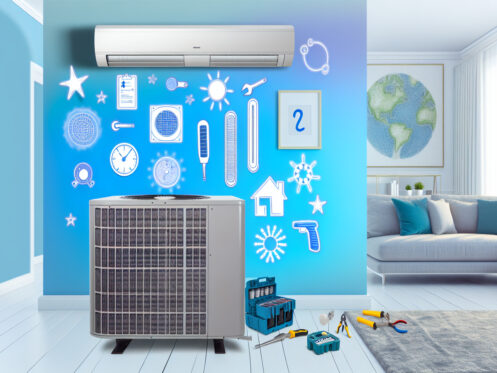When your AC unit starts blowing hot air, it can quickly turn your comfortable home into an unbearable environment. It’s crucial to address this issue promptly to restore a cool and pleasant atmosphere. In this article, we’ll explore the main causes of an AC unit blowing hot air and provide practical fixes to help you resolve the problem.
Common Causes of an AC Unit Blowing H
Have you noticed an unpleasant smell coming from your air conditioner? If your air conditioner smells like mildew, it might mean there is a problem that needs fixing. Not only is the smell unpleasant, but it can also show problems that could harm your health and your air conditioner’s performance. In this article, we’ll look at why your air conditioner smells like mildew and how to fix it.
Why Does My Air Conditioner Smell Like Mildew?
There are several reasons why your air conditioner might start to smell like mildew:
- Moisture buildup: Air conditioners remove moisture from the air, which can sometimes build up and make a damp place where mildew can grow.
- Clogged drain lines: If the drain lines are clogged, water can back up and make a place where mold and mildew can grow.
- Dirty filters: Dirty filters can hold moisture and dirt, which can cause mold to grow.
- Dirty coils: Dust and moisture can collect on the coils and form mold.
- Improper installation: If the air conditioner is not installed correctly, it might not drain properly, leading to moisture buildup.
For more details on why your AC might smell musty, you can read our article on 5 Reasons Why Your AC Smells Musty.
How to Fix a Mildew Smell in Your Air Conditioner
Here are some steps you can take to get rid of the mildew smell in your air conditioner:
- Clean or replace the air filters: Regularly check and clean or replace your air filters. This helps prevent moisture and debris from accumulating.
- Clear the drain lines: Make sure the drain lines are not clogged. You can use a mixture of water and vinegar to clean them out.
- Clean the evaporator coils: Turn off the air conditioner and clean the coils with a soft brush or coil cleaner.
- Check for leaks: Inspect your air conditioner for any leaks that might be causing moisture buildup. Fix any leaks promptly.
- Improve ventilation: Make sure your home has proper ventilation to reduce humidity levels. Using a dehumidifier can also help.
- Schedule professional maintenance: Getting regular maintenance from a professional can keep your air conditioner working well and prevent mildew.
By following these steps, you can help ensure that your air conditioner stays free of mildew and operates efficiently. If you need professional assistance, don’t hesitate to contact Quality Cooling and Heating for expert HVAC services in the Greater Austin area and Abilene.
How to Fix an Air Conditioner That Smells Like Mildew
If your air conditioner smells like mildew, it can be very unpleasant. Luckily, you can follow these steps to fix the problem and make your home smell fresh again. Here’s an easy guide to help you:
1. Turn Off the Air Conditioner
Before you start any cleaning or maintenance, make sure to turn off your air conditioner. This ensures your safety and prevents any electrical issues.
2. Clean or Replace the Air Filter
A dirty air filter can trap moisture and lead to mildew growth. Follow these steps to clean or replace it:
- Locate the air filter, usually found behind the return air grille or inside the air handler.
- Remove the filter and inspect it. If it’s dirty, clean it with water and mild soap. If it’s damaged or very dirty, replace it with a new one.
- Let the filter dry completely before reinstalling it.
3. Clean the Evaporator Coils
The evaporator coils can also harbor mildew. To clean them:
- Access the coils by removing the panel on your indoor unit.
- Use a soft brush to remove any dust and debris.
- Spray a no-rinse coil cleaner on the coils and let it sit for the recommended time.
- Wipe the coils gently with a clean cloth.
4. Check and Clean the Drain Line
A clogged drain line can cause water to back up and create a mildew smell. Here’s how to clean it:
- Locate the drain line, usually a PVC pipe near the indoor unit.
- Use a wet/dry vacuum to clear any blockages.
- Pour a mixture of water and mild bleach into the drain line to kill any remaining mildew.
5. Inspect the Ductwork
Mildew can also grow in the ductwork. Check for any signs of mold or mildew, and consider having your ducts professionally cleaned if necessary. Learn more about our duct cleaning services.
6. Use a Dehumidifier
High humidity levels can promote mildew growth. Using a dehumidifier can help maintain a dry environment and prevent mildew.
When to Call a Professional
While some mildew issues can be resolved with DIY methods, there are times when you should call a professional. Consider reaching out to Quality Cooling and Heating if:
- The mildew smell persists despite your efforts.
- You notice extensive mold growth in the ductwork or other parts of the system.
- You’re unsure how to safely clean or maintain your air conditioner.
Our team at Quality Cooling and Heating is here to help with all your HVAC needs, including repairs, maintenance, and installations. Contact us today to ensure your home stays comfortable and fresh year-round.
ot Air
Several common issues can cause your AC to blow warm air instead of cooling your home. Understanding these causes can help you troubleshoot and fix the problem efficiently. Here are the main reasons your AC might be blowing hot air:
- Thermostat issues: Incorrect settings or a malfunctioning thermostat can lead to your AC blowing hot air. For more details, check out our guide on bad thermostats.
- Dirty air filters: Clogged air filters can restrict airflow, causing the AC to blow warm air.
- Refrigerant leaks: Low refrigerant levels due to leaks can prevent the AC from cooling properly.
- Electrical problems: Issues with the electrical components of your AC unit can affect its performance and cause it to blow hot air.
- Blocked condenser unit: A dirty or blocked condenser unit can hinder the cooling process, resulting in warm air.
By identifying these common causes, you can take the necessary steps to fix your AC and restore a comfortable living environment. For more detailed troubleshooting and solutions, continue reading the following sections.
Thermostat Issues
One common reason your AC unit might be blowing hot air is due to thermostat issues. If the thermostat is set incorrectly or malfunctioning, it can cause the system to misread the temperature and fail to cool your home properly.
Here are some troubleshooting tips for checking and fixing thermostat problems:
- Check the thermostat settings: Ensure that your thermostat is set to ‘cool’ mode and that the temperature is set lower than the current room temperature.
- Inspect the thermostat location: Make sure the thermostat is not exposed to direct sunlight or other heat sources, as this can affect its readings.
- Replace the batteries: If your thermostat uses batteries, try replacing them to see if that resolves the issue.
- Calibrate the thermostat: Sometimes, thermostats can become uncalibrated. Refer to your thermostat’s manual for instructions on how to recalibrate it.
- Upgrade your thermostat: If your thermostat is old or malfunctioning, consider upgrading to a newer, more reliable model.
For more detailed information on thermostat troubleshooting, you can refer to this guide on thermostat troubleshooting.
Dirty Air Filters
Dirty air filters can also cause your AC unit to blow warm air. When air filters are clogged with dirt and debris, they restrict airflow, making it difficult for your AC to cool your home effectively.
Follow these steps to check and replace your air filters:
- Turn off the AC unit: Before inspecting or replacing the air filters, make sure to turn off your AC unit for safety.
- Locate the air filters: Air filters are usually located in the return air duct or the air handler unit.
- Inspect the filters: Remove the filters and check for dirt and debris. If they appear dirty, it’s time to replace them.
- Replace with new filters: Install new, clean filters that match the size and specifications of your old ones.
- Regular maintenance: To keep your AC running efficiently, replace or clean your air filters every 1-3 months, depending on usage and indoor air quality.
For more information on the importance of clean air filters, you can visit this authoritative source on clean air filters.
Refrigerant Leaks
Refrigerant is essential for the cooling process, and when it leaks, the AC can’t cool your home effectively. Here’s what you need to know:
- Signs of a refrigerant leak: You might notice your AC blowing warm air, hearing hissing sounds, or seeing ice on the refrigerant lines.
- Importance of professional repair: Fixing a refrigerant leak requires specialized skills and equipment. It’s best to call a professional to handle this issue safely and effectively. For professional help, visit our air conditioner repair services.
For more information on refrigerant leaks and why professional repair is crucial, you can refer to this trusted HVAC industry source.
Electrical Problems
Electrical issues can also cause your AC unit to blow hot air. Problems with the wiring, circuit breakers, or other electrical components can disrupt the cooling process. Here’s how to identify and address these issues:
- Identifying electrical problems: Look for tripped circuit breakers, faulty wiring, or malfunctioning capacitors. These issues can prevent your AC from receiving the power it needs to operate correctly.
- Addressing electrical problems: If you suspect an electrical issue, it’s important to turn off the power to your AC unit and call a professional. Handling electrical components can be dangerous without proper training. Learn more in our article on AC fan issues.
For a deeper understanding of common electrical issues in AC units, check out this reputable article.
Blocked Condenser Unit
A blocked or dirty condenser unit is a common reason why your AC might be blowing hot air. The condenser unit is located outside and helps to release the heat absorbed from your home. When it gets blocked by dirt, leaves, or other debris, it can’t function properly.
Here’s how to clean and maintain your condenser unit:
- Turn off the power: Always switch off the power to the unit before starting any cleaning.
- Clear debris: Remove any leaves, dirt, or debris around the unit. You can use a garden hose to gently wash away dirt from the fins.
- Check the fins: If the fins are bent, use a fin comb to straighten them out. This improves airflow.
- Professional cleaning: For a thorough cleaning, consider hiring a professional to ensure all parts are properly cleaned and maintained.
Regular maintenance of the condenser unit can prevent it from getting blocked and keep your AC running efficiently. For more detailed guidance, you can refer to this guide on condenser unit maintenance.
When to Call a Professional
While some AC issues can be fixed with simple troubleshooting, there are times when you need to call a professional. Here are situations where professional HVAC services are necessary:
- Persistent Issues: If your AC continues to blow hot air despite your efforts, it’s time to call a professional. They can perform a comprehensive inspection and repair.
Hiring a professional ensures that your AC unit is repaired correctly and safely. For more information on the benefits of professional HVAC services, check out this article on professional HVAC services.
If you’re experiencing issues with your AC unit, don’t hesitate to contact Quality Cooling and Heating for reliable and professional HVAC services. We offer a range of services, including emergency repairs, to ensure your home stays comfortable year-round.


